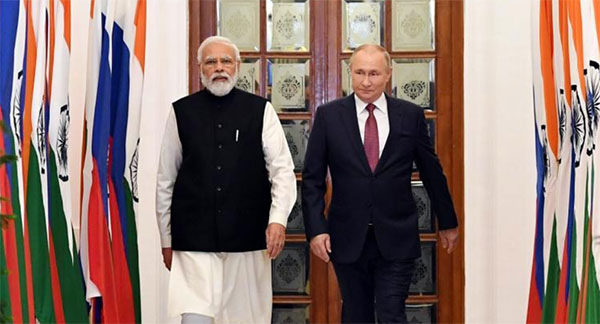By The Independent
Copyright independent

How America and her so called allies became arrogant to the point of missing the massive shifts in global power
THE LAST WORD | ANDREW M. MWENDA | The recently concluded Shanghai Cooperation Organization (SCO) meeting in Tianjin, China, attracted a lot of attention on both traditional and social media. A video of Indian prime minister Narendra Modi holding the hand of Russian president Vladimir Putin and walking over to hold a friendly chat with Chinese president Xi Jinping dominated all media outlets. India and China are the most populous countries on earth, each with a population of over 1.4 billion people, while Russia is the largest country in the world by geographic size, with the largest stockpile of nuclear weapons.
That scene of the three leaders in a close chat in seeming closeness led many to wonder whether these were mere optics or represented a real emergence of a new block of powerful nations to challenge the US [and her Western vassal states]-led global order. Did the camaraderie between the three leaders signal the end of the unipolar world order and the emergence of a new multipolar world? The media ignored the fact that 24 countries attended, 22 of which were represented by their heads of state or heads of government. Only Egypt and Indonesia did not send a president.
There is no doubt that the US-led world order is facing terminal decline. This is a good thing for the world because, as the saying goes, power corrupts, and absolute power corrupts absolutely. This is the fate the US has suffered since the end of the first Cold War. Since 1990, the US has been acting like a bull in a china shop. It has abandoned diplomacy and now relies largely on military coercion and economic intimidation to get its way around the world. It bombs countries it does not like, invades some to secure regime change, finances a genocide in Gaza, and manipulates countries like Ukraine to use them as cannon fodder to weaken her rivals like Russia.
The tragedy of the world is that America’s so-called allies, a group of 27 nations of Western Europe, are mere vassal states. They follow what their master asks of them without question. As I have written before, Europe has moved from a strategic dependence on the US security umbrella to a non-strategic and self-defeating subservience to US agendas. Yet to build a safer and fairer world, we need a dynamic Europe that enjoys strategic autonomy and is able to be an independent pole of power. In such circumstances, Europe would balance both the US and China, allying with one to stop the other from acting recklessly. But in doing America’s bidding, Europe has isolated itself from the rest of the world.
Take the example of American-led sanctions against Russia over its invasion of Ukraine. None of the 54 countries of Africa sanctioned Russia, and neither did any of the 22 countries of the Middle East and 33 countries of Latin America and the Caribbean. Only four of Asia’s 48 countries (Japan, South Korea and Singapore) and two of the Pacific’s 16 countries (Australia and New Zealand) sanctioned Russia. Thus, 175 countries have not sanctioned Russia. Hence, in trying to isolate Russia, the West has isolated itself. Given that the world population is eight billion people, the American-led countries that sanctioned Russia constitute only 1.04 billion people, 12.5% of the global population. And the West claims they are acting democratically. Absurd!
The international system needs democratic reform. It is built on factors that have long been overtaken by events. For instance, the UN Security Council has five permanent members with veto powers. They were selected because of their victory in World War Two and because at the time they were great powers. The ten largest economies in the world by PPP are China, the USA, India, Russia, Japan, Germany, Indonesia, Brazil, France and the UK. Why do France and UK remain on the UNSC as permanent members with their small economies and populations? And how is this democratic?
The same applies to other global institutions such as the IMF. Although it claims to give voting power based on economic contribution, in real fact it doesn’t. For instance, while China’s contribution to it is 17%, it has only 6% of the voting power. The US, with a 17 percent contribution, has 23% voting power. The US and her vassal states also use the IMF to force a particular set of ideological and policy prescriptions on member countries. In most of these cases, these policy prescriptions are detrimental to the countries being forced to adopt them while beneficial to the interests of American and European corporations. This is why many people around the world would like to see the emergence of an alternative center of power.
Attempts by the US and her vassal states to dictate to the world are now facing increasing resistance, in large part because power in the world has significantly shifted from them. This is why claims of “crippling” sanctions against Russia by America and her vassal states did not cripple that country. On the contrary, the Russian economy has been growing faster than EU economies. Indeed, the EU has suffered the most from sanctioning Russia—facing deindustrialization and inflation due to high energy prices leading to loss of global competitiveness. This has led to a catastrophic decline in living standards, a factor that has strengthened right-wing political parties that are hostile to liberal democracy—the very ideal they claim to be fighting for in Ukraine. The irony is that in fighting for democracy in Ukraine, the Europeans are losing it at home.
The US has created a narrative that its attempts to contain China reflect a conflict between democracy and autocracy. The Chinese retort that it is between plutocracy and meritocracy. China is the leading trading partner of 140 countries. This gives it considerable influence and power. Nearer home in Africa, the West has lost its role as the major trading partner, the main source of development assistance, and the largest source of foreign direct investment. All these three factors tell us that the West has little influence and leverage in most countries on our continent.
Attempts by Trump to use tariffs to scare China and India have failed. Instead, they worked on Europe because the EU has accepted a subservient position to the US. Thus, the EU president went to Washington DC to beg. In a humiliating meeting with Trump accepted a very unequal and unfair trade deal. This was an unprecedented show of subservience. Who will save Europe?
amwenda@ugindependent.co.ug



